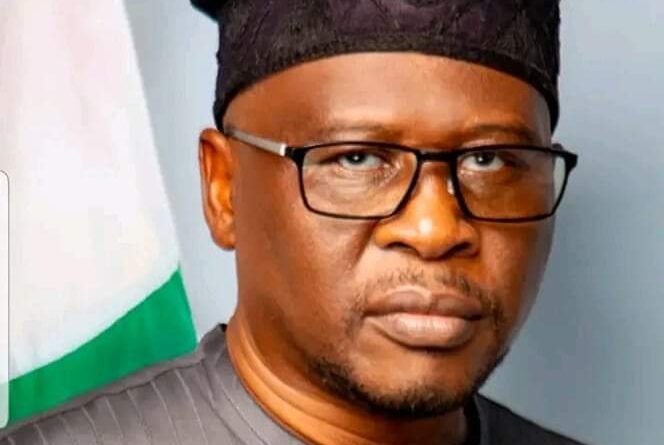Opinion: Gongola Summit: If propaganda failed to defeat Governor Fintiri in 2023, it will fail again now.
Recently, the Gongola summit prompted a heated debate regarding the approaching 2027 elections, notably the incumbent governor’s apparent invincibility.
This summit brought together political elites, analysts, and media figures to delve deeply into the mechanics of electoral strategy, governance, and public perception.
The alarming article, “Who’s Behind the Gongola People’s Forum?” written by a coupist who supports a rogue to declare a candidate winner in the middle of an election captures an emotional response from me.
An unemployed man, resentful of the governor’s victory in 2023, wrote an article amid a scheme by some individuals to precipitate a civil coup in Adamawa in 2023, which the people opposed.
This Gongola gathering, in my opinion, invites a critical investigation of the divisions within various ethnic nationalities that identify as Gongola groupings to debate what affects them.
I have significant questions concerning the nature of politics practiced today by individuals who say Adamawa is a state created solely for them; normally, I would have to join concerns with the distributor of phoney opinion writeups tagged: Who’s Behind Gongola People’s Forum?
However, we must repair the record for future generations. Because we live in an era of information overload and quick material transmission via digital channels, the line between legitimate political discourse and planned propaganda can blur.
This phenomenon highlights the significance of media literacy and critical thinking in the general populace. First, I’m curious about the origin of the ethnic cauvinism issue alleged by the coupists at the “Gongola Summit,” which brought together various factions.
When did it become illegal in Adamawa to invite a specific ethnic group to any assembly at all? In the penultimate week, a new rumour circulated that a group intended to hold a summit at Ribadu’s Square in Yola.
Several dignitaries, including the governor and his deputy, as well as notable individuals like Jerry Gana and TY Danjuma, did not attend the event. In their ambition for dominance, those who believe they own Adamawa use deceptive techniques and media campaigns to defame and execute Governor Fintiri.
This tactic will culminate in 2023, when the INEC rogue REC, Hudu Yunusa Ari, proclaims a candidate the winner in the middle of the election. However, this ignorant person’s voice fades into the background, like a whisper in the wilderness.
They’ve just recently regained the ability to speak up for the untouchable and express their concerns. What role did Governor Fintiri play at the Gongola Summit, if I may inquire? Is it reasonable for a governor to detain the meeting coordinator?
The governor’s best option for remaining impartial is to avoid attending the conference, but this is still a triumph for those who lost their bid for office in 2023.
With deep respect to Atiku Abubakar, Murtala Nyako, and Prof. Jibril Aminu, who are still alive to witness the governor’s treatment of them for themselves, I don’t believe the trio of Atiku, Nyako, and Aminu did not require a spokesman that hides behind the pains of the 2023 defeat, which are bitter pills to swallow.
I also feel the author of this nonsensical piece is still perplexed as to how the governor defeated Hudu and his supporters. In general, Governor Fintiri is building a new Adamawa that is consistent with our goals, and he has no desire to further conflict with the vanquished adversaries of 2023, who have defined themselves as representatives of a single ethnic group in Adamawa.
Finally, why is there such a fascination with Governor Fintiri? The reason is simple: anything beneficial elicits hostility, but I can assure the author of the piece that nothing will prevent the governor from putting Adamawa on the world map.
The 2023 election demonstrated that Governor Fintiri, who is undefeated through propaganda, is equally unbeatable during elections. The governor’s accomplishments serve to lessen the impact of negative propaganda efforts.
Furthermore, the governor’s leadership narratives undermined the effectiveness of propaganda itself. Civilian coup supporters have traditionally used propaganda to alter public opinion, but they should think carefully about its ethical implications and long-term ramifications.
In an era of increased polarization and distrust in institutions, the proper use of social media is critical, but not for Admawa supporters of the failed civilian coup.
Finally, the remark “If the governor cannot be defeated in 2023, he cannot be defeated by propaganda” serves as a rallying cry for self-reflection and strategic realignment in Nigeria’s political environment.
While the Gongola summit’s debates have sparked heated debate and differing viewpoints, the underlying message is consistent with the larger objective of encouraging informed civic involvement and participatory democracy.
As Nigeria prepares for the next electoral cycle, the lessons learned from this summit may be useful in changing the contours of political discourse and electoral outcomes in the years ahead.
Article written by Solomon Kumangar
Perm. Sec. Adamawa state ministry for information and strategy




